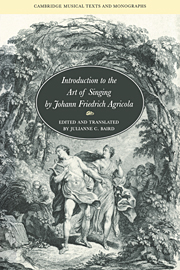Book contents
- Frontmatter
- Contents
- Acknowledgments
- Introduction: Agricola's treatise
- INTRODUCTION TO THE ART OF SINGING
- Translator's preface
- Foreword of the author
- Introduction of the author
- 1 Observations for the use of the singing teacher
- 2 Concerning appoggiaturas
- 3 Concerning trills
- 4 Concerning divisions
- 5 Concerning recitative
- 6 Remarks intended especially for the music student
- 7 Concerning arias
- 8 Concerning cadenzas
- 9 Remarks for the use of the professional singer
- 10 Concerning improvised variations of melodies
- Notes
- Bibliography
- Index
Introduction of the author
Published online by Cambridge University Press: 10 December 2009
- Frontmatter
- Contents
- Acknowledgments
- Introduction: Agricola's treatise
- INTRODUCTION TO THE ART OF SINGING
- Translator's preface
- Foreword of the author
- Introduction of the author
- 1 Observations for the use of the singing teacher
- 2 Concerning appoggiaturas
- 3 Concerning trills
- 4 Concerning divisions
- 5 Concerning recitative
- 6 Remarks intended especially for the music student
- 7 Concerning arias
- 8 Concerning cadenzas
- 9 Remarks for the use of the professional singer
- 10 Concerning improvised variations of melodies
- Notes
- Bibliography
- Index
Summary
1. Various are the opinions of the ancient historians concerning the origin of Music. Pliny believes that Amphion was the inventor; the Greeks maintain that it was Dionysius. Polybius attributes it to the Arcadians; and Suidas and Boethius give all the glory of the invention to Pythagoras, asserting that he, from the sound of three blacksmiths' hammers of different weights, discovered the diatonic scale; to which Timotheus the Milesian later added the chromatic; and Olympicus, or Olympus, the enharmonic. One reads in the sacred writings, however, that Jubal of the line of Cain was the father of those who play on stringed and piped instruments, both apparently capable of producing different harmonic tones – from which one sees that Music appeared shortly after the creation of the world.
2. So as to be sure of not erring in her precepts, she accepted many laws of Mathematics; and, after various instructions from it concerning lines, numbers, and relationships, Music thus received the pleasant name of Daughter of Mathematics, in order that she might merit thereby the title of a science.
3. One might assume that over the course of thousands of years, Music has always been the tender delight of the human race, but for the fact that the Lacedaemonians took such excessive delight in it that it seemed necessary to ban the above-mentioned Milesian from that Republic, so that the subjects would not neglect their domestic, state, and military activities.
- Type
- Chapter
- Information
- Publisher: Cambridge University PressPrint publication year: 1995

